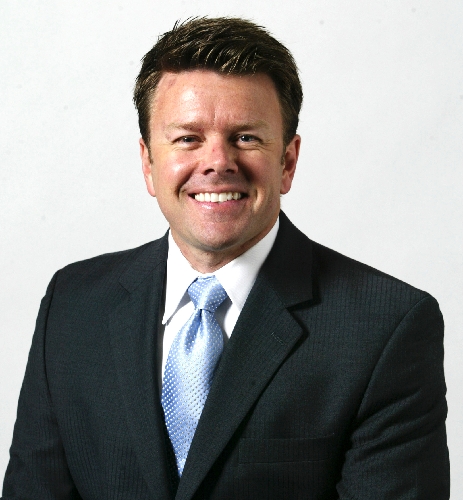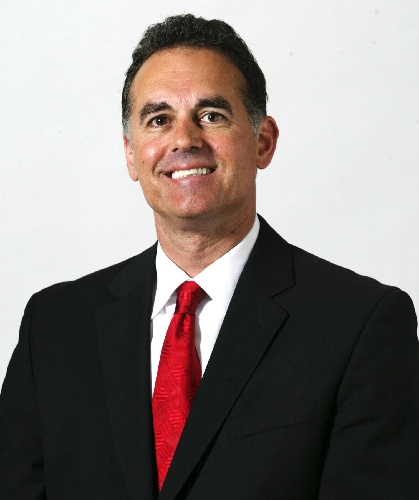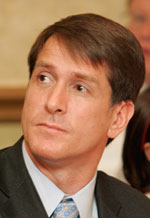Republicans speak out on oil spill
The Gulf Coast disaster shouldn't stop the United States from expanding offshore oil drilling because the country must do more exploration to reduce dependence on foreign oil, say the top Republican U.S. Senate candidates.
But the GOP contenders for U.S. Sen. Harry Reid's seat have a few different takes on energy development in light of the April 20 oil rig explosion and resulting slick spreading along the coast, including how to prevent accidents and ensure Americans don't pick up the tab for costly cleanups.
In response to questions from the Review-Journal, the Senate hopefuls each emphasized that the nation and Nevada must pursue new energy sources, including oil, nuclear, gas, geothermal, clean coal, solar and wind, which could help the state diversify its tourism- and gaming-dependent economy.
Here's a look at their answers:
SUE LOWDEN
"For both economic and national security reasons, we should do all we can to become energy independent as a nation -- including continued expansion of offshore drilling," said former state Sen. Lowden, currently the Republican front-runner in the crowded GOP primary.
"Further, we should not force energy companies to drill so far off the coasts that their energy production becomes more dangerous and prone to disasters, taking significantly more time to mitigate if and when they occur," she added, referring to the higher risks of deep-water operations.
Lowden withheld her opinion on whether she supports a provision Sen. Lindsey Graham, R-S.C., crafted for an energy bill to allow more domestic offshore drilling, saying she hadn't seen the language added to legislation aimed at curbing greenhouse gas emissions. But Lowden said she strongly agrees with Sen. Joe Lieberman, I-Conn., "that this rare accident should not cause domestic oil production to be taken off the table."
"We should also allow for energy production in Alaska and within the continental United States," Lowden said of U.S. efforts to become energy independent. "What kind of civilized, industrialized nation would inflict major economic and national security volatility on itself by restricting its own access to affordable and reliable energy resources -- thus forcing us to become more reliant on OPEC nations?"
DANNY TARKANIAN
Real estate developer Danny Tarkanian maintained that it is "vital to our energy independence" to explore more offshore drilling, which he argued "will only help advance the development of safety features for a technology and industry that has withstood the test of hurricanes and time."
Tarkanian said he doesn't support the pending energy bill in its current form because it includes so-called cap- and-trade provisions, which he said would impose burdensome regulations on U.S. industry, which would have to reduce pollution levels or pay for the right to exceed limits.
"Instituting cap-and-trade will devastate our domestic energy production and outsource over a million jobs to countries with lower or no emission standards like China and Russia," Tarkanian said, using a well-honed Republican argument against the cap-and-trade bill. "The end results will be an increased dependence on foreign counties and massive utility cost increases for energy consumers."
SHARRON ANGLE
Former Reno Assemblywoman Sharron Angle said any offshore drilling risk is worth the reward.
"The present U.S. dependence on foreign oil jeopardizes our security far beyond the cost of a potential oil spill in financial terms and loss of life," Angle said. "Offshore drilling is one of the options we should pursue to minimize the national security risks associated with foreign oil dependence."
The United States imports about two-thirds of its oil from the top half dozen import countries including Canada, Mexico, Venezuela, Nigeria, Saudi Arabia and Iraq, in order of volume.
Angle also said authorities must respond to the findings of the accident investigation by moving to "safeguard the Gulf (of Mexico) with regard to any foreign and domestic entities drilling off our coast."
As for the energy bill, Angle like other Republicans in the Senate race and most in Washington oppose the cap-and-trade legislation, which critics believe will raise consumers' power bills as utilities pass on to consumers the cost of measures to control pollution with the goal of halting global warming.
"It will tax Nevadans on their electricity that uses clean coal generation," Angle said.
JOHN CHACHAS
Wall Street investment banker John Chachas called the Gulf Coast disaster a "terrible ecological problem, but like airplane crashes, it is a rare and very unusual occurrence that really shouldn't stop us from running offshore drilling efforts."
Chachas, an Ely native, said the focus should be on preventing accidents and making sure oil companies have enough "reclamation reserves" to pay to repair any environmental damage.
"Offshore drilling is a compelling source of energy independence," Chachas said. "This accident doesn't dissuade me from believing we should allow private energy companies to pursue these reserves. It does persuade me that the reclamation 'reserves' that such companies need to be prepared for may be larger than anyone anticipated."
There has been a move in Congress by Democrats to raise a $75 million cap on oil companies' legal liability for economic damages, with Sen. Bill Nelson, D-Fla., suggesting $10 billion. Reid said he supports raising the liability cap as Nelson proposes.
Reid initially said he thought the accident at energy giant BP's Deepwater Horizon drilling rig would help the cause of climate legislation: "What's happening in the Gulf (of Mexico), does that endanger energy legislation?" Reid asked early this week. "I think quite to the contrary. I think it should spur it on."
Later, however, Reid said President Barack Obama's March 31 proposal to expand offshore drilling in the eastern Gulf of Mexico and the Arctic and Atlantic oceans could be delayed.
"I think we're all going to back off from offshore drilling until we get a better handle of how we can make it safe," Reid said.
Chachas said he would like to reduce the nation's dependence on oil, and he wondered why the state and the country wasn't doing more to develop natural gas supplies and nuclear energy.
"We have 2.5 trillion cubic feet of natural gas on mainland America and yet no real policy for its exploitation. Why?" he asked. "We created the nuclear industry, and yet we're petrified of putting Yucca Mountain into effect to store waste so that we can have a more robust nuclear industry."
CHAD CHRISTENSEN
Las Vegas Assemblyman Chad Christensen said Nevada should lead the way on finding as many energy sources as possible to reduce dependence on foreign oil.
"We have the potential to be the Silicon Valley of energy in Nevada with oil, nuclear, geothermal, solar and wind," Christensen said, referring to California's computer industry-rich middle.
Christensen said he would vote against the pending Senate energy bill because of the cap- and-trade provisions, but he supported adding offshore drilling provisions, calling it "a step forward."
"Remove the cap-and-trade provisions, and I would take another look at the bill, but not until then," he said, calling efforts to limit greenhouse gas emissions "too restrictive on consumers and businesses."
Contact Laura Myers at lmyers@reviewjournal.com or 702-387-2919.





















